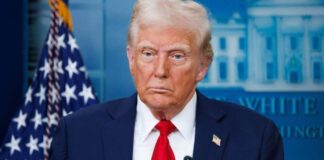In a recent social media post on Truth Social, former President Donald Trump urged the U.S. Congress, especially the Senate, to reconsider its approach to foreign aid, advocating for a shift from unconditional gifts to strategic loans. Trump asserted that the United States should lend money to foreign nations with favorable terms, including zero interest and an extended repayment period, while emphasizing that it should be contingent on the recipient country’s allegiance and future economic success.
The 45th president’s call for a revamped foreign aid strategy aligns with his “America First” policy, a cornerstone of his presidency, and the ongoing “Make America Great Again” (MAGA) movement. Trump’s foreign policy, marked by a reevaluation of the United States’ role in multilateral efforts, garnered both support and controversy on the global stage. He questioned the disproportionate financial burden on the U.S. and prioritized domestic interests, mainly supporting American producers and manufacturers over international counterparts.
Trump’s push for a loan-based foreign aid system is rooted in the belief that the U.S. should no longer assist without expecting a return, asserting that the nation should not act “stupid” any longer. This stance reflects his frustration with what he perceives as outdated and disadvantageous international agreements that fail to prioritize American interests.
The former president’s suggestion comes amid his 2024 presidential campaign, where he continues to champion a foreign policy record that has reshaped alliances and prompted a reevaluation of global partnerships. Despite initial opposition, Trump’s policies have led to increased investment by partner nations in organizations like NATO, signaling a shift towards more equitable burden-sharing.
As Trump gears up for the 2024 election, he remains vocal about reforming U.S. foreign aid policies. In a rally in Conway, South Carolina, he reiterated his stance just days after the Senate rejected a $118 billion foreign security package, which he openly opposed. Trump’s influence on public opinion is evident in his record-breaking week at the polls, surpassing his 2016 record in the Nevada Republican Caucus. This success has fueled his commitment to the “Final Battle” in 2024, where he pledges to confront the Deep State, challenge warmongers, expel globalists, and rid the government of ideologies such as communism, Marxism, and fascism.
Acknowledging the challenges ahead, Trump thanked South Carolina for its overwhelming support and emphasized the shared goal of liberating the country from what he perceives as tyrants and villains. The upcoming South Carolina primaries, scheduled for Feb. 24, hold significant importance as Trump aims to secure more delegates on his path to the 2024 presidential nomination.
As Trump navigates the political landscape in South Carolina, where he currently dominates the polls, he faces competition from only one contender – former U.N. ambassador Nikki Haley. Despite Haley’s determination to perform well in South Carolina, recent polling data from RealClearPolitics indicates a substantial lead for President Trump. He commands an impressive 30.7-point advantage over Haley, polling at 60.0 percent, while she lags behind at 29.3 percent.
The data underscores the resonance of Trump’s foreign aid proposal and “America First” approach with the electorate. His decisive stance on loans over gifts resonates strongly with voters, contributing to his commanding lead in the polls.
Donald Trump’s call for a strategic shift in foreign aid reflects his commitment to prioritizing American interests on the global stage. With a pro-Republican tone, he advocates for a loan-based approach that ensures a return on investment and aligns with his “America First” policy. As the 2024 campaign unfolds, Trump’s foreign policy legacy continues to shape the discourse, resonating with supporters who share his vision for a more assertive and self-interested United States.



















